Journey to the US Cyber Team: An Athlete's Perspective
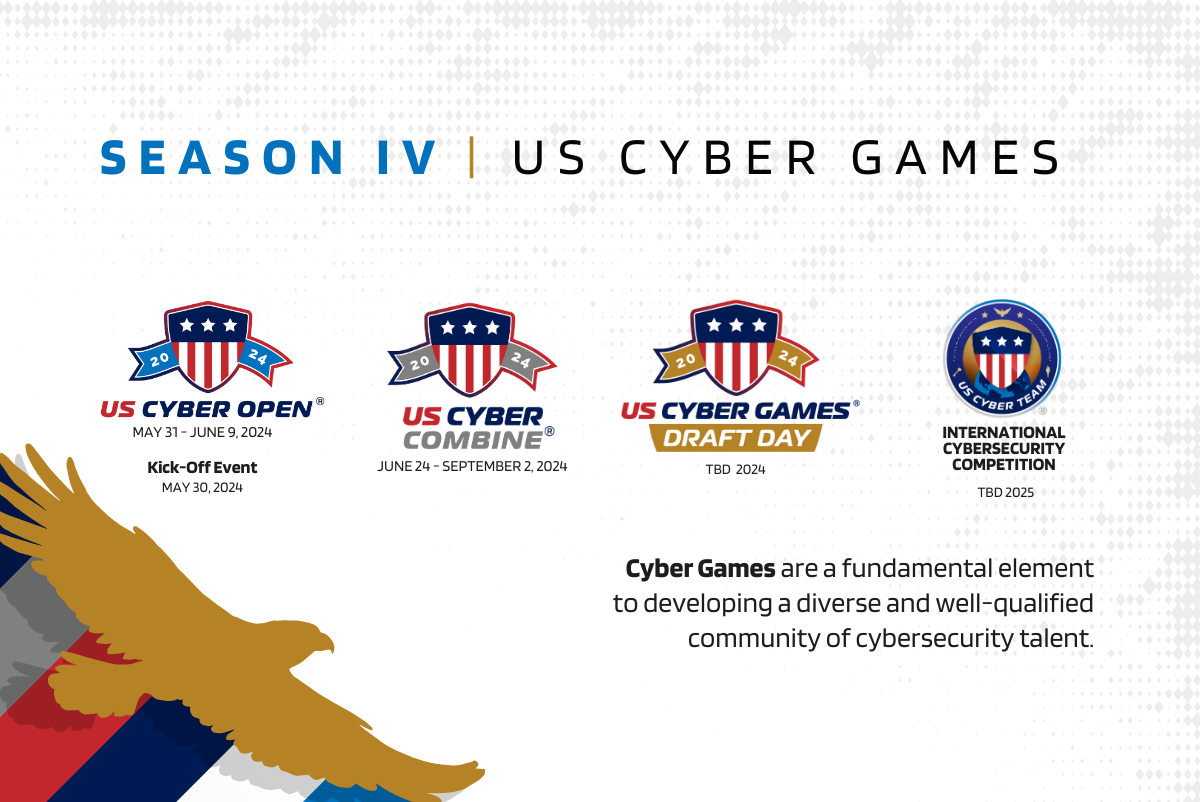
Contents
The Road to Joining the US Cyber Team
In a previous blog post, we covered details about the US Cyber Games program. That post touched on items such as what the USCG is, why it exists, requirements for athletes to be on the team, and the International Cybersecurity Challenge (ICC). In this post, you’ll get specifics on each step of the process and some athlete perspectives on their journeys.
> US Cyber Open™
Each year, the US Cyber Games program begins with the US Cyber Open. The Open is a free, Capture the Flag (CTF) competition for all ages and all skill levels. Anyone can join this event, encompassing two sections, a Beginner’s Game Room, and a Competitive CTF. The Season IV, US Cyber Open will run from May 31 - June 9, 2024.
BEGINNER'S GAME ROOMThe Beginner's Game Room is an entry-level part of the US Cyber Open and is included when registering for the CTF competition. Athletes can start here, and then move to the CTF whenever comfortable, or stay in the game room and play. The beginner’s game room is open for 10 days (May 31 - June 9, 2024). This is a great opportunity for people new to CTFs and competitive cyber challenges. It’s a stress-free way to try out your skills and practice solving some challenges.
COMPETITIVE CTFThe Competitive CTF consists of virtual cybersecurity challenges across a variety of cybersecurity domains, such as cryptography, forensics, binary exploitation, reverse engineering, web, and more. Prizes are awarded to the top scorers in each CTF category and to the overall champion. Along with prizes, all participants will receive digital badges that can be displayed on social profiles, applications, and resumes. The Competitive CTF lasts for 7 days (June 3-9, 2024).
You can check out the Season III, US Cyber Open leaderboard here: https://www.uscybergames.com/season-3-cyber-open-ctf-leaderboard
Some stats on the participants in the Season III, US Cyber Open can be found in the image below.
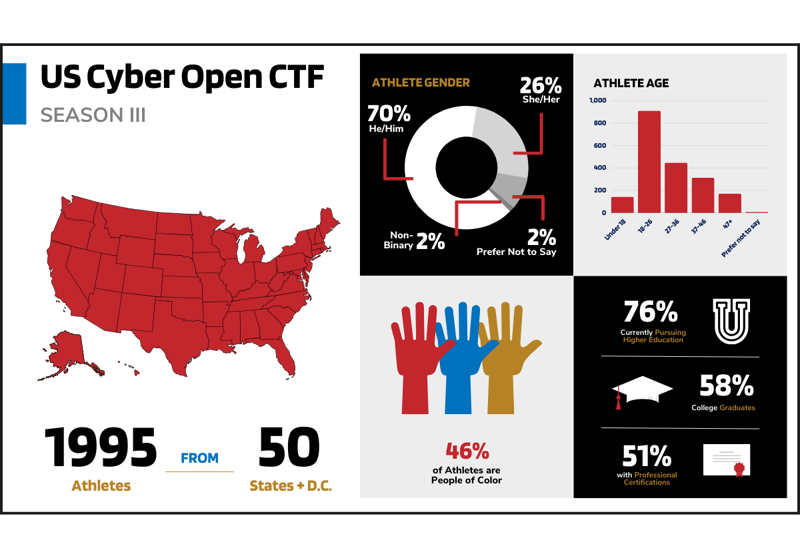
Both sections of the Open are for individual competitions, they are not team games. If you want a better shot at making the Combine, definitely take part in the Competitive CTF. This isn’t a hard requirement, but if you place well you are very likely to make the Combine.
Recommendation: Compete in the Open, and submit the Combine application. Pretty simple really. Of course, if you place high in the Open CTF you’ll have great odds of making the combine, but also spend some time displaying what you bring to the table in that application. It’s not long, but you shouldn’t be afraid to include details.
> Season IV, US Cyber Combine™
Based on individual CTF scores and the Combine application, a select number of cyber athletes, ages 16 to 25, are invited to participate in the US Cyber Combine. The Combine houses several virtual learning opportunities, hands-on exercises, and competitions over 2 months.
The US Cyber Combine is similar to a sports combine in which athletes undergo a cyber aptitude evaluation, interview with multiple coaches and technical mentors, train weekly in cybersecurity skills via games, and compete in advanced CTF scrimmages to build their portfolio for the US Cyber Team Draft.
The US Cyber Combine is where you will do your best to shine and show the coaches why you should be selected to be a member of the Season IV, US Cyber Team. The Combine is designed to test you, but also to provide top athletes with a unique experience to hear from leading experts in their field. The selected coaching staff will use this time to get to know each athlete and to understand their skills and competencies. Athletes who perform well during the Combine will have the opportunity to accumulate digital badges for performance and skills.
If you think you have what it takes and want a position on the US Cyber Team, make sure to register for the US Cyber Open CTF and complete your Combine application request. The Combine invitation request applications are more important than US Cyber Open CTF scores.
Recommendation: Make sure to separate yourself somehow. Be as active as possible. Things such as attending as many lectures as you can, communicating in the group chat, completing the assignments, and athlete observations. There are lots of talented people here, it’ll take work to make the team.
> Season IV, US Cyber Team Draft
The selection and drafting of the Season IV, US Cyber Team® members will take place in the fall of 2024 during a live Draft Day event.
Following the US Cyber Combine, the coaches meet to select which top cyber athletes are invited to join the next season's team. Athletes are evaluated based on their applications, aptitude, interviews, effort, attitude, and skill. The final US Cyber Team is purposely diverse bringing different backgrounds and skills to play key roles on the team. Once the team is formed, members get the opportunity to represent the United States at a variety of global scrimmages and the International Cybersecurity Championship (ICC). The current Season III, US Cyber Team consists of 30 athletes. 13 athletes are new (2 from the Season II, Pipeline Program) and 17 are returning athletes.
Athletes can expect their time commitment to vary between 4-8 hours per week depending on their role and the progress of the season. The more practice you put in, the better you will be.
Recommendation: I’ve found that there is a pretty direct link between skill and time spent learning and pwning boxes. A passion for CTFs is definitely an important characteristic for athletes.
If you are not one of the lucky 30, you can still potentially earn a spot on the Pipeline Program. This is a 4-month program designed to teach high-performing athletes in hopes of obtaining future team spots.
> Just the Beginning
The Season III team and coaches are now preparing for the next ICC via scrimmages, training camps, and more. Ultimately, select members of the Season III, US Cyber Team will represent the United States at the International Cybersecurity Championship (ICC) in 2024. All travel expenses will be paid for those athletes who make the US Cyber Team and are chosen for international competition. The ICC team was made up of 15 US Cyber Team athletes in 2023. The ICC consisted of a series of challenges such as web application and system exploitation, cryptography, reverse engineering, hardware challenges, and attack/defense challenges.
> Athlete Journeys
So now you know the process to make the team, let’s hear from a few of the SIII, US Cyber Team members on their specific journeys.

Shiloh Smiles: I came across the S3 US Cyber Open as either an advertisement on some other site or as an email I happened to notice. I greatly enjoyed CTF's in college, especially NCL, and served as my school's competitive cyber team lead, where I directed dozens of students of varying levels through CTFs and red team/blue team competitions. I didn't realize there were avenues for me to compete outside of collegiate spaces. I immediately signed up. Unfortunately, I was TDY doing red team operations during the week of the Open and didn't get to actually compete. I suppose my resume/application must have caught some eyes though, because after the Open, I received an email inquiring as to if I had signed up for the Open under a different username. I explained that, no, I hadn't, and that I unfortunately had to work during that week but that I was grateful for the follow-up. Much to my surprise, I received an invite to the Combine anyway! When I started to research the biographies and accomplishments of past cyber team members and my fellow Combine competitors, I realized I needed to step up my game if I wanted a fighting chance. Due to my experience in my undergrad at The Citadel, I have a very strong background in leadership, confidence, discipline, time management, problem-solving, public speaking, and teamwork. Although my CTF'ing skills were not anything special compared to those around me, I knew my soft skills would make me stand out. I planned out my schedule months in advance, scheduling to the hour every single lecture, practice session, and time I would need to improve/demonstrate my skills. I reached out to several US Cyber Team athletes to receive advice and mentoring, as well as to many others in the Combine that I admired. I was never afraid to ask a question, even if it showed my lack of experience. My goal was to become better, not to appear to be the best. I realized early on that I could be a strong force multiplier, and I leaned into that. I was excited about my in-person interview, as it would also give me a chance to demonstrate my skills in verbal communication and public speaking-- something that is becoming increasingly more difficult post-pandemic, especially in high-tech spaces. My favorite part of the Combine was organizing an ad hoc CTF team full of Combine/USCG athletes. We were the first to clear my college's internationally-attended CTF. Going into the draft, I was feeling very confident in having achieved my goal in the Combine. However, that goal was to be selected for the Pipeline Program. I was shocked and excited to find out that I had been selected for the US Cyber Team proper.
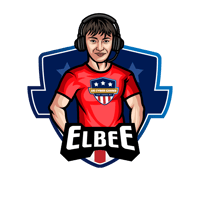
Dylan Knoff: I originally started getting into cyber in high school via my Computer Science teacher. A roommate and I both became invested in picoCTF 2018 and eventually, I started an online CTF team that would compete during the weekends. It's through this team that I got to network and meet people who'd mentor me and give me the foundation to carry on with my own research. I heard about the US Cyber Team and their US Cyber Combine program during my senior year of high school through my friend Chris. After many monster-caffeine-prodigy fueled nights I worked my way onto the Pipeline Program and then the season 3 team.
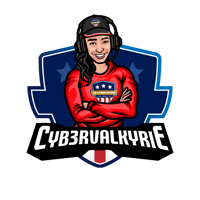
Gwendolyn Vongkasemsiri: I first heard about the US Cyber Open CTF for Season I when I was in high school, through an email from the organizers of the NSA Codebreaker. It looked interesting, so I played in it and ended up placing 50th (overall leaderboard). Although players under 18 were not allowed on the team for that first year, I was still invited to the Season I US Cyber Combine and allowed to participate as a trainee. I was thrilled to be invited and I had an absolute blast during that first Combine, learning a ton and meeting a lot of incredibly talented CTF players! The coaches awarded me a Rising Star award at the end and I was also privileged enough to be invited to the Accelerated Training Program created by Coach Jasmine (S1 CTF Coach), which is now called the Pipeline Program. I am very grateful to the coaches and mentors teaching; I learned many new techniques during the program! I was excited to participate in Season II when the program ended, and was over the moon when I made the team that year! I remember literally jumping up and down and doing a mini happy dance when I found out. I trained with the team during Season II and got to play with "Team Africa & The World" for the CTF day at ICC and help with the conference. I've grown in so many ways since the beginning and am so excited to have made the US Cyber Games Team for the second time for Season III, and I'm looking forward to the team being stronger than ever before!

Dr. Dane Brown (Coach): When I stumbled upon the fliers announcing the formation of the US Cyber Team in Season 1, I thought this might just be the once-in-a-lifetime opportunity I've been waiting for! So, I applied to coach but got initially turned down (I guess my overflow didn't quite make it to the return address). Undeterred, my persistence paid off, and I negotiated a spot as a technical mentor. As fate would have it, a few months later the Red vs Blue Coach (@mubix) had to take a hiatus, and they asked me to step in. Fast forward a couple of seasons, and here I am still working closely with this elite team of ninjas (or should I say binjas?) as an Assistant Head Coach. Recruiting and shaping this diverse, talent-packed team has been a wild yet rewarding ride, and I'm genuinely excited about the impact they'll make on the future of the cybersecurity industry.

Chris Haller (Coach): I'm a coach, and I’m really impressed with the team's performance over the last few years and knew I wanted to be a part of it! Coach Haller might be short on words, but he is definitely not short on knowledge!
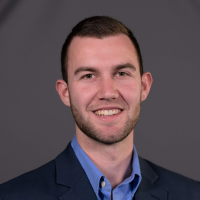 And lastly, let me share my journey.
And lastly, let me share my journey.
Unlike the other athletes here, I am part of the USCG Program S3 Team in a different manner. I am on the Tiger/OPS (Operational Program Support) team. This team is composed of 6 individuals who bring immense value to the program, and while not a part of the competitive team, are working with the team members in various methods to help them be best prepared for the ICC. I got here entirely through my Combine application. I had done the Open in 2022, and didn’t make the Combine. At some point, I must have unsubscribed from USCG emails and that caused me to miss the email for the S3 Open. I signed up for it online, but just never received info on how to access the CTF. A bit embarrassing, but luckily I was able to make the Combine still. I’ve been able to earn a decent amount of certifications and do have CTF experience, so that helped my application. During the Season 3 Combine I knew I wasn’t the most skilled member, there are some CTF wizards out there, but I did bring blue team cybersecurity experience that made me unique. I also had a decent social media presence on Linkedin, and that has helped me to learn a lot, and grow in helping others by sharing resources, ideas, and knowledge. I did interview fairly well and I guess I made an impression on someone. It has been a blast working with the S3 team so far, and I’m excited to help them bring home gold in October.
AUTHOR: Micah VanFossen
Micah is a SIEM / Data Engineer. He works to defend against threats by identifying, obtaining, and utilizing relevant data to create detections and inform strategic decisions. He holds a Master's degree in Cybersecurity and a list of top industry certifications, but the differentiator in his career has been his passion to learn, create solutions, and educate others. He is a firm believer in resourceful education and the power of curiosity.
Stay in
the Know
Be the first to know the latest news about the US Cyber Games and Team including upcoming competitions, events, merch and more!

US Cyber Games® is committed to inform and inspire the broader community on ways to develop tomorrow’s cybersecurity workforce. Our mission is to bring together elite cyber athletes, coaches, and industry leaders to help scout, train, and send a US Cyber Team® to take the gold at the International Cybersecurity Challenge (ICC). US Cyber Games is led by Katzcy, in cooperation with the NICE program at the National Institute of Standards and Technology (NIST).
This project is supported by NICE, a program of the National Institute of Standards and Technology in the U.S. Department of Commerce, under financial assistance award #70NANB22H102.
© 2026 US Cyber Games. All Rights Reserved.






